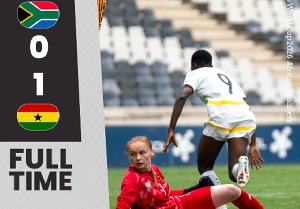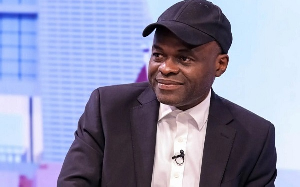After closely watching this national asset on GTV and listening to the sterling responses from the barrage of questions posed to him, the only question that begs immediate response is, why was Dr Spio Garbrah kept at bay from the core of national or government business for all this while?
I suppose so because Ghana would have accrued a lot benefits from the depth of his international and intellectual experiences had the ruling NDC government on the assumption of power in 2009 grafted him into mainstream government business. Could it be that intra party polarity is dimming the shine or competence of perceived detractors as that may be case of Dr Spio Garbrah?
By this, I am not asserting that the ‘vettee’ held the magic wand to swell our pockets with money should he have been given the opportunity earlier. The meat of the foregone view hinges on the fact that he could have been a helpful hand in contributing meaningfully to Ghana’s backward strides.
Ghana’s burgeoning democracy must clearly purge itself of internal and external political extremism. President Barack Obama had to rope in John Kerry and Hillary Clinton for the sake of national development and interest after garnering political power despite a stiff competition and opposition from them. Why can we not as a nation in the name of national integration and development pursue such innocuous path? In fact, there are vital lessons that can be gleaned from the vetting.
In the first place, Dr Spio Garbrah clearly and repeatedly trumpeted what Ghanaians have been told already to partly do to boost the cedi and industrial growth: the need to purchase and utilise goods made in the country. He buttressed this assertion with the Japan experience.
Per his account, the Japanese government in a nationalistic drive backed by legislation asked its citizens to patronise Japanese rice as opposed to purchasing imported rice from the United States of America into their country. And it worked perfectly to revamp their rice industry.
Beyond this, he made a strong but passionate appeal for state protocol to patronise rice, chicken and other food products that are produced in Ghana instead of imported ones. He further challenged government and for that matter parliament to push for the purchase of office furniture from local companies that have the capacity to produce them so far as the completion of Job 600 (Office complex for members of parliament) is concerned.
For my money, this is domestication at its best. The late Dan Lartey of GCPP has been vindicated. The ‘operation feed yourself’ mantra of the late Kutu Acheampong still has relevance in the twenty first century. All that is needful as of now is for leadership to look inward and purge itself of the needless unbridled penchant for foreign products which can equally be produced in the country.
It is only after this that the government will have the moral and economic right to preach Ghanaians into consuming made in Ghana goods. Exemplary leadership is germane in changing the attitudes of followers. Closely related to the above is the level of support local infant industries are sourcing from central government to ward off competition from foreign firms.
In any case what is the quantum of monetary and technical supports from government toward technical and vocational education? What are the partnership bridge between Apostle Kwadwo Sarfo and the government to engender the transfer of technology to other ordinary artisans? After the GYEEDA and SADA fiascos, I wonder the overwhelming impact the Youth Enterprise Support (YES) fund will make in the lives of the country’s teeming youth.
Why is it not possible to integrate the Apostle Kwadwo Sarfo model into technical education in the country? It seems to me the lifeline to Ghana’s under development is progressive and integrated national policy not myopic party manifestoes. And this can be achieved through a sense of unflinching commitment and sacrifice on the part of government and individuals.
The other side of the vetting pertains to Dr Spio Garbrah’s personality. When the infamous ‘Team B’ phrase assumed a cacophonic political dimension, he unreservedly apologised as of that time for that buccal blunder. Even during the vetting, his apologetic predisposition amplified his preparedness to commit himself to national unity and progress.
Now, the lesson inherent in this act of humility and sincerity as exhibited by the ‘vettee’ is the need for our national leaders and figures irrespective of their political affiliation or orientation to openly admit and apologise for their goofs whenever they do so. And they must clearly demonstrate maturity through their willingness to do better if given a new lease of opportunity.
Therefore, the erroneous impression that leaders are infallible must be discarded. It is an archaic mental anomaly that has no place in the twenty first century Ghana. Mr Chung Hong-Won, the former prime minister of South Korea, had to resign over the recent sinking of a ferry that had about 300 passengers on board. (Source: www. theguardian.com- South Korean prime minister resigns over ferry sinking). This gesture epitomises leadership taking ultimate responsibility in the event of mishap.
However, how many government appointees and elected officers can do same in the wake of the payment of dubious judgement debts? Those monies could have been used to disentangle a cross section of the poor from the fatal jaws of poverty. Who has being held accountable for or is being punished for the wanton and careless sale of state companies for paltry sums? Whose neck is on the line in the midst of the poor performance of the cedi?
It is pretty palpable that Ghana’s economic challenges are self inflicted. External factors count for less. If the nation’s revenues, grants, and loans are diverted into ventures that seem to result in low or no economic fortunes, should we expect anything positive in the lives of the masses? Our leaders must not forget, it is often said, it is impossible to do the same thing and expect a different result.
Dr Spio Garbrah’s vetting has vital lessons for all. The views expressed so far reflect a crescent of the full plate of what transpired. I can only hope that he will marshal his competencies and work closely with his colleagues to revive the dwindling economic fortunes of the country within the short time at his disposal.
AUTHOR: OKOFO-DARTEY SAMUEL
EMAIL: sodesq2000@yahoo.com
Opinions of Friday, 15 August 2014
Columnist: Okofo-Dartey, Samuel














